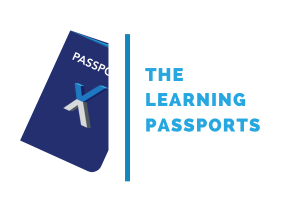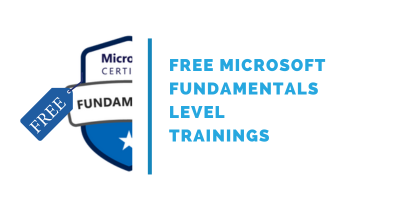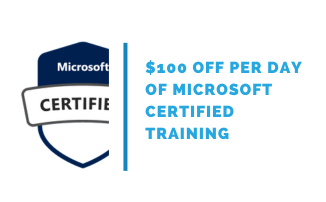
Microsoft Certified: Power Automate RPA Developer Associate (PL500)

The world of automation and robotic process automation (RPA) is rapidly evolving, and Microsoft Power Automate has emerged as a powerful tool for streamlining business processes. For individuals looking to excel in this field, achieving the Microsoft Power Automate RPA Developer certification (PL-500) is a significant step.
This Microsoft certified course teaches participants how to automate time-consuming and repetitive tasks by using Microsoft Power Automate. They review solution requirements, create process documentation, and design, develop, troubleshoot, and evaluate solutions. Candidates work with business stakeholders to improve and automate business workflows. They collaborate with administrators to deploy solutions to production environments, and they support solutions.
This training is a comprehensive preparation for the PL-500: Microsoft Power Automate RPA Developer exam for obtaining the Microsoft Certified: Power Automate RPA Developer Associate certification.

Public class
Duration:
4 days / 28 hours
Private class
Virtual classroom
Minimum no. of participants: 5
4 days / 28 hours
Price on request
English or French
Training plan:
Microsoft Power Automate RPA Developer (PL-500T00)
Module 1: Take your first steps with Power Automate for desktop
- Introduction to Power Automate for desktop
- Console overview
- Flow designer overview
- Create a simple flow
Module 2: Power Automate for desktop development essentials
- Introduction to Power Automate for desktop development
- Create a flow in the flow designer
- Create conditionals and loops
- Using subflows
- Test and debug flows
- Manage UI elements and images
- Deploy exception handling
Module 3: Build your first Power Automate for desktop flow
- Set up the environment
- Explore Power Automate for desktop
- Create your first Power Automate for desktop flow
- Record Power Automate for desktop actions
- Edit and test recorded actions
Module 4: Define input and output parameters in Power Automate
- Set up in Power Automate
- Define an input variable
- Set input variables
- Define output variables
- Add UI elements and test
Module 5: Integrate desktop flows with Outlook connector in Power Automate for desktop
- Setup process in Power Automate
- Build a cloud flow that's triggered in Outlook
Module 6: Connect a cloud flow to desktop flows in Power Automate for desktop
- Setup in Power Automate for desktop
- Create a new cloud flow
- Connect your cloud and desktop flows
Module 7: Use AI Builder to process invoice forms in Power Automate
- Solution setup in Power Automate
- Create a form processing flow
- Add fields and collections of documents
- Analyze and train a model
- Integrate the model into a cloud flow
Module 8: Use the Teams connector in Power Automate
- Work from an existing solution in Power Automate
- Create an approval solution
- Integrate with an existing desktop flow
- Build communication with Outlook
Module 9: Run a Power Automate for desktop flow in unattended mode
- Set up an unattended desktop flow
- Create a new cloud flow that calls an existing flow in unattended mode
- Perform a test run
Module 10: Optimize your business process with process advisor
- Get familiar with process advisor
- Create your first recording
- Edit recordings and group actions
- Analyze recordings and interpret results
- Automation recommendations
Module 11: Handle variables in Power Automate for desktop
- Create, edit, and use variables
- Variable data types
- Advanced data types
- Input and output variables
- Variable manipulation
- Sensitive variables
Module 12: Automate repetitive tasks using loops in Power Automate for desktop
- Introduction to loops
- Loop actions
- Simple loop actions
- For each loop actions
- Loop condition actions
Module 13: Adjust process behavior using conditional actions with Power Automate for desktop
- Introduction to conditional actions
- Conditional actions
- The If group of actions
- The Switch group of actions
Module 14: Configure flow control in Power Automate for desktop
- Flow control actions
Module 15: Generate Power Automate for desktop flows by recording
- Introduction to the Power Automate for desktop recorder
- Create desktop flows using the recorder
Module 16: Configure exception and error handling in Power Automate for desktop
- About exceptions
- Exception handling
Module 17: Control file and folder handling in Power Automate for desktop
- Folder actions
- File actions
Module 18: Web automation in Power Automate for desktop
- Launch, close, and handle browsers
- Handle web pages and forms
- Extract data from web pages
- Direct web access and scripting
Module 19: Use Power Automate for desktop to interact with windows and applications
- UI elements
- Window handling and element interaction
Module 20: Excel automation in Power Automate for desktop
- Launch, save, and close an Excel file
- Read from an Excel document
- Write to an Excel worksheet
- Additional actions and features
- Manage worksheets
Module 21: Automating email handling in Power Automate for desktop
- Automate webmail services
- Automate Outlook
- Automate Exchange servers
Module 22: Automate system, workstation, and services actions in Power Automate for desktop
- System and workstation actions
- Services actions
Module 23: Communicate using message boxes in Power Automate for desktop flows
- Message box actions
Module 24: Text manipulation in Power Automate for desktop
- Text handling actions
- Date time actions
Module 25: Simulate mouse and keyboard actions by using Power Automate for desktop
- Mouse and keyboard actions
Module 26: Combine Power Automate desktop and cloud flows
- Introduction to running Power Automate desktop flows from cloud flows
- Run a Power Automate desktop flow from a cloud flow
Module 27: Database handling in Power Automate for desktop
- Database actions
Module 28: Active Directory handling in Power Automate for desktop
- Active Directory actions
Module 29: Scripting in Power Automate for desktop
- Scripting actions
Module 30: OCR technologies in Power Automate for desktop
- OCR actions
Module 31: Get started with custom connectors in Power Automate
- Demo of the maker portal experience
- Explore custom connector configuration options
- Use a custom connector
Module 32: Configure custom connectors with authenticated APIs in Power Automate
- Authentication options
- Use APIs with Azure AD
- Configure Azure Active Directory authentication
- Share and move between environments
Module 33: Introduction to Microsoft Power Platform security and governance
- Identify Microsoft Power Platform environments
- Data Loss Prevention policies
- Microsoft Power Platform Center of Excellence Starter Kit
Exclusives:
- One FREE attendance to the Microsoft 365 Certified: Fundamentals (MS900) training - $695 value!
- One voucher to take the exam - $225 value!
- One year access to the class recording
- 180 days access to the lab environment after class
- Up to date courseware with Microsoft Learn
- Microsoft course achievement badge
Prerequisites:
Candidates should have experience with JSON, cloud flows and Azure services, integrating solutions with REST and SOAP services, analyzing data by using Microsoft Excel, VBScript, Visual Basic for Applications (VBA), HTML, JavaScript, one or more programming languages, and the Microsoft Power Platform suite of tools (AI Builder, Power Apps, Dataverse, and Power Virtual Agents).
Credentials information:
Exam Characteristics
- Exam code: PL-500
- Exam Title: Microsoft Power Automate RPA Developer
- Exam Duration: 180 minutes
- Number of Questions: 40 to 60
- Questions Format: Multiple-choice, multiple-answer, scenario-based
- Passing Score: 700 out of 1000
- Cost: $0 (included in your training)
Exam Topics
- Design automations
- Develop automations
- Deploy and manage automations
- All details...
Follow-on trainings:
Audiences:
Eccentrix Corner writing/whitepaper:
Power Automate Certification Overview
The Power Automate certification (often referred to as PL-500) is designed for professionals seeking to validate their skills as Microsoft Power Automate RPA Developers. This certification serves as a testament to your ability to build efficient automation solutions using Microsoft Power Automate, and it is recognized as a valuable credential in the world of automation.
The importance of the Power Automate Certification
In today's business landscape, automation plays a pivotal role in improving efficiency and reducing operational costs. Companies are actively seeking professionals who can leverage Microsoft Power Automate to streamline their processes. By earning the PL-500 certification, you not only enhance your knowledge but also become a sought-after candidate for positions related to automation and RPA development.
Certification path
To achieve the PL-500 certification, you'll need to pass the PL-500 exam, which assesses your knowledge and skills in various aspects of Microsoft Power Automate RPA development.
Study resources
Preparing for the PL-500 exam is essential to secure your Microsoft Power Automate RPA Developer certification. Here's a roadmap to help you get started:
- Official Microsoft Learning Path: Begin your preparation with the official Microsoft Learning Path for PL-500. This resource provides structured guidance on the topics you need to cover.
- Training and Certification: Consider enrolling in our training program and certification courses dedicated to Microsoft Power Automate. The PL-500 training provide in-depth insights and hands-on practice.
- Hands-On Experience: Practical experience is invaluable. Try building automation solutions using Microsoft Power Automate to reinforce your understanding.
- Study Resources: Explore books, study guides, and online resources related to PL-500 to supplement your knowledge.
- Practice Exams: Take advantage of practice exams and sample questions to assess your readiness for the PL-500 exam.
- Online Communities: Join online forums and communities where you can engage with fellow learners and experts, share insights, and seek guidance.
Certification Renewal
Your Microsoft Power Automate RPA Developer certification is valid for two years. To maintain your certification, you'll need to pass a renewal assessment. Renewal questions and answers can be found on the official Microsoft certification website. It's essential to stay updated with the latest trends and technologies in cloud security to ensure a smooth renewal process.
Conclusion
The Microsoft Power Automate RPA Developer certification (PL-500) is your key to a promising career in automation and RPA development. With the increasing demand for automation professionals, this certification not only enhances your skills but also opens doors to exciting career opportunities. To embark on this journey, begin your preparation, explore the official Microsoft Learning Path, and take practical steps to become a certified Microsoft Power Automate RPA Developer. Your expertise in automation and RPA development will be in high demand, and the PL-500 certification will set you on a path to success.
Common Questions About Microsoft Power Automate RPA Developer Certification (PL-500) (FAQ)
What is PL-500?
PL-500 is the code for the Microsoft Power Automate RPA Developer certification. It is a credential that validates your skills in building efficient automation solutions using Microsoft Power Automate. This certification is essential for professionals aspiring to excel in the field of automation and robotic process automation (RPA).
How hard is PL-500?
The difficulty of the PL-500 certification exam can vary from person to person, depending on your prior experience and knowledge in automation and RPA development. While it is a challenging exam, with the right preparation, including studying relevant resources, taking practice exams, and gaining hands-on experience with Microsoft Power Automate, many candidates find it manageable. It's crucial to dedicate sufficient time and effort to understand the exam topics and practice RPA development skills.
How do I prepare for PL-500 certification?
To prepare for the PL-500 certification, follow these steps:
- Start with the official Microsoft Learning Path for PL-500, which provides structured guidance on the topics you need to cover.
- Enroll in training programs and certification courses dedicated to Microsoft Power Automate for in-depth insights and hands-on practice.
- Gain practical experience by building automation solutions using Microsoft Power Automate.
- Explore books, study guides, and online resources related to PL-500 to supplement your knowledge.
- Use practice exams and sample questions to assess your readiness for the PL-500 exam.
- Join online forums and communities to engage with experts, share insights, and seek guidance.
What does PL mean in Microsoft?
In Microsoft certifications, "PL" typically stands for "Power Learning," and it is often associated with certifications related to the Power Platform, including Power Automate. Microsoft uses these codes to categorize and identify specific certification exams and learning paths within their certification program.
Contact us for more information on pricing::
Eccentrix
Office: 1-888-718-9732
E-mail: info@eccentrix.ca
130, King Street West, Suite 1800
Toronto, Ontario M5X 1E3
www.eccentrix.ca





